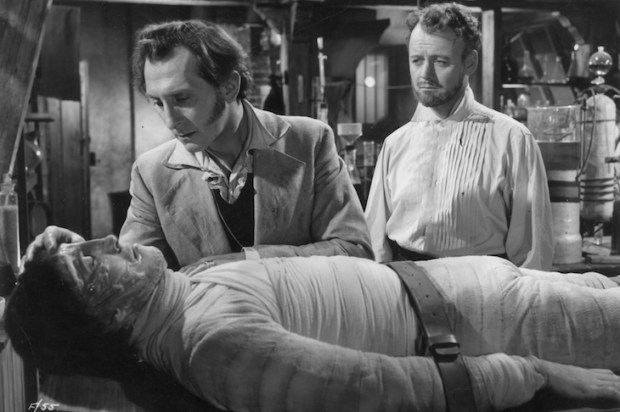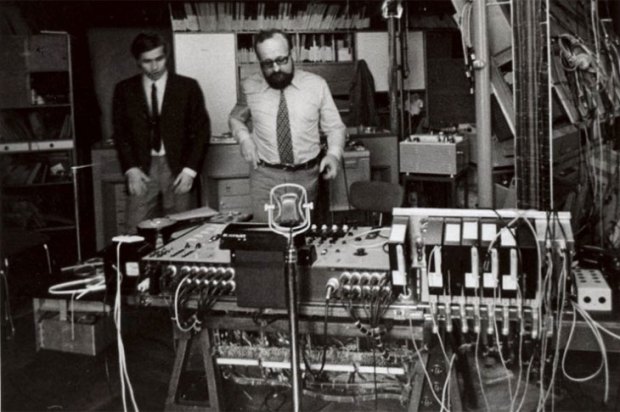Evan Davis’s series on business life, The Bottom Line (made in conjunction with the Open University), has become one of those Radio 4 staples, something that’s just there in the schedule and all too easily taken for granted. Productivity, contracts and contacts, the new appreneurs (creators and sellers of apps) are not subjects I feel the need to know very much about and the business pages of the newspaper usually get sent straight out for recycling. But Evan always draws me in and keeps me listening because of his enthusiasm, his ability to make even the mundane aspects of manufacturing sound fascinating, and his skill at drawing people out, employing very different techniques from those used in his news interviews, much less abrasive, more about using his guests’ skills and knowledge to tell a story, make a point.
The format is incredibly simple, as is always the case with programmes that run and run. Evan just chooses a topic and invites three guests to discuss it. You could say it’s In Our Time for the business world. But somehow it’s usually more alive, more practical than that because Evan’s guests are always not just at the top of their game but are carefully chosen to reflect every dimension of the topic under discussion. Take this week when Evan and his guests were talking about that buzzword ‘outsourcing’. His guests were the chief executive of Northamptonshire County Council, who was brought in five years ago to cut the workforce from 12,000 to 4,000. His aim now is to get it down to 150 — by contracting out virtually all of the work on roads, hospitals, libraries, social care to privately run organisations. (As Davis neatly pointed out, Northamptonshire just happens to be a Conservative-led council.)
Also round the table was the chief executive of a family business making chilli sauce, set up in November 2008 by his mum and dad. They began in a kitchen, moved to a shed but have now decided to develop the brand rather than to keep on making the sauce themselves in ever larger quantities. Last up was the head of Serco, a very different story. It’s the global company that provides services such as rubbish collection, Boris bikes, ‘justice’ and ‘immigration’ to governments, big and small, and, as Evan deftly teased out, got into trouble for overcharging the British government on its prisoner-tagging contract. Isn’t outsourcing really about cutting labour costs, not better outcomes, suggested Evan. ‘Don’t we have to be honest about it?’
On Your Farm is another staple that I don’t often catch (not being an early-morning person) but like to know it’s still there in the Radio 4 schedule. On Sunday Ruth Sanderson met a 96-year-old in Kent who is still working, full-time. Reg Huntley has been selling agricultural supplies — feed, medicines, sheep dip — for almost eight decades, running his own business until two years ago when he sold it to a big corporation. They proceeded to rehire him, recognising that because he knew his farming customers so well (some families through three generations) he was an invaluable member of the sales team.
‘Do you think you should still be working?’ Sanderson asked, code for still driving. ‘I can’t bear being inside doing nothing,’ said Reg, who still goes to the gym and has been avoiding ‘rubbish food’ since long before artisan bakers and Abel & Cole.
Book at Bedtime, also on Radio 4, has been a bit hit-and-miss lately but for the past fortnight I’ve been gripped by Owen Sheers’s I Saw a Man (produced by Mair Bosworth). I’m not sure I quite believed Michael would have kept going, climbing the stairs in his neighbour’s house, thinking they were out, wondering whether he would find an intruder, or that he would have behaved quite as he did after the tragic denouement. It was also a bit extraordinary to listen to a novel set in the summer of 2008 among simple folk in Hampstead that also took us to bleakest Wales, the Pakistan borderlands and an airforce base just outside Las Vegas. But it was all in the quality of the writing — and the reading (by Mark Bazeley).
The event heavily hinted at in the Radio 4 trail doesn’t actually happen until episode six and the adaptation was in places a bit clunky (although that could have been the fault of the book itself), but no matter, there’s enough meat in the telling to keep you riveted. Michael, we discover, is a writer who has made his name from a book about the real lives of two brothers that is written up like a novel, using, as he says, ‘the freedoms of descriptive fiction to make the real lives he wrote about even more real’. Sheers, too, captures each moment with a simplicity and ease that, in the detail, seems believable, if not in the outlines of the plot. Usually I prefer to hear classics read in this slot but just occasionally the fast-paced narrative of a contemporary novel hits the spot.
Got something to add? Join the discussion and comment below.
Get 10 issues for just $10
Subscribe to The Spectator Australia today for the next 10 magazine issues, plus full online access, for just $10.
You might disagree with half of it, but you’ll enjoy reading all of it. Try your first month for free, then just $2 a week for the remainder of your first year.














Comments
Don't miss out
Join the conversation with other Spectator Australia readers. Subscribe to leave a comment.
SUBSCRIBEAlready a subscriber? Log in